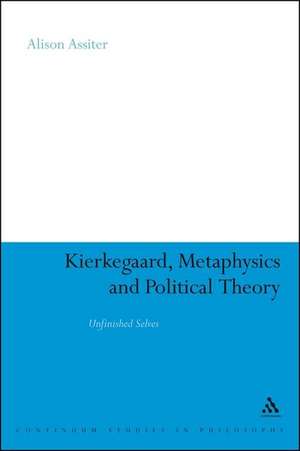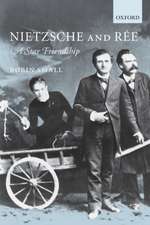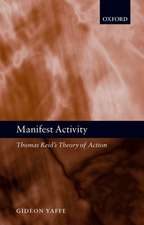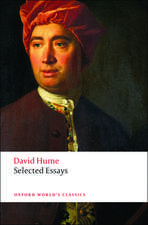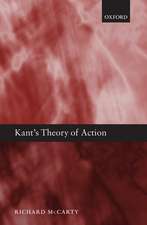Kierkegaard, Metaphysics and Political Theory: Unfinished Selves: Continuum Studies in Philosophy
Autor Professor Alison Assiteren Limba Engleză Paperback – 26 oct 2011
Alison Assiter argues that the notion of the person that lies at the heart of the liberal tradition is derived from a Kantian and Cartesian metaphysic. This metaphysic, according to her, is flawed and it permeates a number of aspects of the tradition. Significantly it excludes certain individuals, those who are labelled 'mad' or 'evil'. Instead she offers an alternative metaphysical image of the person that is derived largely from the work of Kierkegaard.
Assiter argues that there is a strand of Kierkegaard's writing that offers a metaphysical picture that recognises the dependence of people upon one another. He offers a moral outlook, derived from this, that encourages people to 'love' one another.
Inspired by Kierkegaard, Assiter goes on to argue that it is useful to focus on needs rather than rights in moral and political thinking and to defend the view that it is important to care about others who may be far removed from each one of us. Furthermore, she argues, it is important that we treat those who are close to us, well.
Assiter argues that there is a strand of Kierkegaard's writing that offers a metaphysical picture that recognises the dependence of people upon one another. He offers a moral outlook, derived from this, that encourages people to 'love' one another.
Inspired by Kierkegaard, Assiter goes on to argue that it is useful to focus on needs rather than rights in moral and political thinking and to defend the view that it is important to care about others who may be far removed from each one of us. Furthermore, she argues, it is important that we treat those who are close to us, well.
| Toate formatele și edițiile | Preț | Express |
|---|---|---|
| Paperback (1) | 255.19 lei 6-8 săpt. | |
| Bloomsbury Publishing – 26 oct 2011 | 255.19 lei 6-8 săpt. | |
| Hardback (1) | 888.65 lei 6-8 săpt. | |
| Bloomsbury Publishing – 23 mai 2009 | 888.65 lei 6-8 săpt. |
Din seria Continuum Studies in Philosophy
-
 Preț: 255.58 lei
Preț: 255.58 lei -
 Preț: 256.59 lei
Preț: 256.59 lei - 22%
 Preț: 256.29 lei
Preț: 256.29 lei - 31%
 Preț: 890.62 lei
Preț: 890.62 lei - 18%
 Preț: 304.66 lei
Preț: 304.66 lei -
 Preț: 254.93 lei
Preț: 254.93 lei - 24%
 Preț: 249.00 lei
Preț: 249.00 lei - 22%
 Preț: 889.49 lei
Preț: 889.49 lei - 31%
 Preț: 890.86 lei
Preț: 890.86 lei - 22%
 Preț: 1064.84 lei
Preț: 1064.84 lei - 31%
 Preț: 947.54 lei
Preț: 947.54 lei - 23%
 Preț: 255.11 lei
Preț: 255.11 lei - 31%
 Preț: 888.74 lei
Preț: 888.74 lei - 31%
 Preț: 890.72 lei
Preț: 890.72 lei - 22%
 Preț: 1005.49 lei
Preț: 1005.49 lei - 22%
 Preț: 946.72 lei
Preț: 946.72 lei -
 Preț: 254.75 lei
Preț: 254.75 lei - 22%
 Preț: 1005.98 lei
Preț: 1005.98 lei - 31%
 Preț: 889.15 lei
Preț: 889.15 lei - 31%
 Preț: 1006.06 lei
Preț: 1006.06 lei - 22%
 Preț: 889.23 lei
Preț: 889.23 lei - 22%
 Preț: 947.86 lei
Preț: 947.86 lei - 22%
 Preț: 256.49 lei
Preț: 256.49 lei - 31%
 Preț: 888.58 lei
Preț: 888.58 lei - 14%
 Preț: 1006.24 lei
Preț: 1006.24 lei - 31%
 Preț: 891.51 lei
Preț: 891.51 lei - 22%
 Preț: 1005.89 lei
Preț: 1005.89 lei -
 Preț: 256.38 lei
Preț: 256.38 lei - 31%
 Preț: 1152.60 lei
Preț: 1152.60 lei - 23%
 Preț: 255.38 lei
Preț: 255.38 lei - 22%
 Preț: 1006.72 lei
Preț: 1006.72 lei - 31%
 Preț: 946.72 lei
Preț: 946.72 lei - 22%
 Preț: 257.76 lei
Preț: 257.76 lei - 22%
 Preț: 1005.18 lei
Preț: 1005.18 lei -
 Preț: 256.49 lei
Preț: 256.49 lei -
 Preț: 256.38 lei
Preț: 256.38 lei - 31%
 Preț: 1003.53 lei
Preț: 1003.53 lei -
 Preț: 258.42 lei
Preț: 258.42 lei - 19%
 Preț: 464.39 lei
Preț: 464.39 lei - 22%
 Preț: 1005.89 lei
Preț: 1005.89 lei - 22%
 Preț: 1005.56 lei
Preț: 1005.56 lei - 11%
 Preț: 465.66 lei
Preț: 465.66 lei - 22%
 Preț: 1006.62 lei
Preț: 1006.62 lei - 13%
 Preț: 255.66 lei
Preț: 255.66 lei
Preț: 255.19 lei
Nou
Puncte Express: 383
Preț estimativ în valută:
48.84€ • 50.80$ • 40.32£
48.84€ • 50.80$ • 40.32£
Carte tipărită la comandă
Livrare economică 15-29 aprilie
Preluare comenzi: 021 569.72.76
Specificații
ISBN-13: 9781441199690
ISBN-10: 1441199691
Pagini: 176
Dimensiuni: 156 x 234 x 9 mm
Greutate: 0.25 kg
Editura: Bloomsbury Publishing
Colecția Continuum
Seria Continuum Studies in Philosophy
Locul publicării:London, United Kingdom
ISBN-10: 1441199691
Pagini: 176
Dimensiuni: 156 x 234 x 9 mm
Greutate: 0.25 kg
Editura: Bloomsbury Publishing
Colecția Continuum
Seria Continuum Studies in Philosophy
Locul publicării:London, United Kingdom
Caracteristici
Presents a new metaphysical picture of the person, inspired by Kierkegaard, and makes an original contribution to political theory.
Notă biografică
Alison Assiter is Professor of Feminist Theory at the University of the West of England, UK. Her previous publications include The Limitations of Althusserianism, Pluto Press, 1990 Enlightened Women, Routledge, 1996 and Revisiting Universalism (Palgrave Macmillan, 2003).
Cuprins
Introduction
1. The Metaphysical Assumptions of the Classical Liberal
2. Human Rights and Fundamentalism.
3. Some Limitations of the Discourse of Human Rights.
4. Autonomy and "Evil'.
5. The Beginnings of an Alternative Metaphysic and Ethics
6. Natural Needs
7. Metaphysics and Morality
8. Love for Family, Friends and Close Associates
Conclusion
1. The Metaphysical Assumptions of the Classical Liberal
2. Human Rights and Fundamentalism.
3. Some Limitations of the Discourse of Human Rights.
4. Autonomy and "Evil'.
5. The Beginnings of an Alternative Metaphysic and Ethics
6. Natural Needs
7. Metaphysics and Morality
8. Love for Family, Friends and Close Associates
Conclusion
References/Notes
Index
Recenzii
"A remarkable book! Alison Assiter writes with passion and refinement of the history of modern philosophy's contributions to an understanding of our troubled world. She revives Soren Kierkegaard both as a general philosopher and as a guide to a moral politic that both thinks and feels." - Charles Lemert, The John C. Andrus Professor of Sociology, Wesleyan University, USA
"Who would have thought that Kierkegaard has interesting things to teach us about politics, of all things? But he has, and Assiter shows us how. More importantly, she also shows us why what he says matters: an impressive achievement!" - Bob Brecher, University of Brighton, UK
'A fresh way of thinking about ethics and human rights ... many lines of argument are examined ... a thoughtful and original work.' - Times Higher Education
'An illuminating and thought-provoking book which covers a wide range of political theory ... a useful book for both undergraduates and post-graduates in Gender Studies as well as Philosophy and Political Theory.' - European Journal of Gender Studies
Assiter's Kierkegaard stands alongside the works of other important thinkers in realist philosophy and social theory over the last decade in that it also provides depth, nuance and focus to an aspect of the issue of realizable wellbeing in terms of some constructive critique- here, that of liberalism... I wholly recommend it to anyone interested in experiencing the power of ideas to change the way we think for the better.
"Who would have thought that Kierkegaard has interesting things to teach us about politics, of all things? But he has, and Assiter shows us how. More importantly, she also shows us why what he says matters: an impressive achievement!" - Bob Brecher, University of Brighton, UK
'A fresh way of thinking about ethics and human rights ... many lines of argument are examined ... a thoughtful and original work.' - Times Higher Education
'An illuminating and thought-provoking book which covers a wide range of political theory ... a useful book for both undergraduates and post-graduates in Gender Studies as well as Philosophy and Political Theory.' - European Journal of Gender Studies
Assiter's Kierkegaard stands alongside the works of other important thinkers in realist philosophy and social theory over the last decade in that it also provides depth, nuance and focus to an aspect of the issue of realizable wellbeing in terms of some constructive critique- here, that of liberalism... I wholly recommend it to anyone interested in experiencing the power of ideas to change the way we think for the better.
